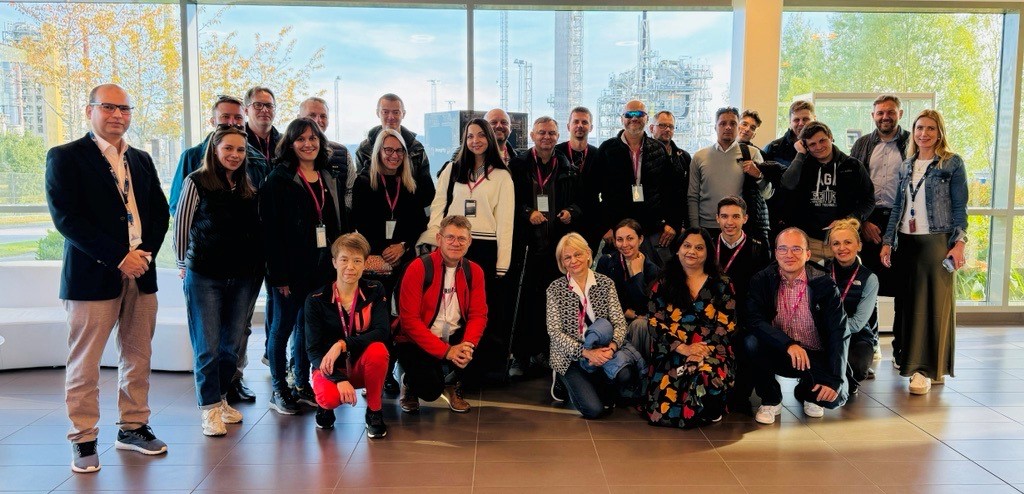30.09.2024
Polish Delegations Visit Norway to Experience CCS in Action
In 2024, two groups comprising 59 industry leaders and researchers from Poland travelled to Norway to explore its extensive carbon capture and storage (CCS) initiatives.
The first group from Poland visited in April and the second in September, with both delegations touring the Northern Lights project in Øygarden and the Technology Centre Mongstad (TCM).
“By learning from these projects, Poland can expedite the development of its CCS infrastructure and reduce the risks associated with being a first mover,” says Paweł Gładysz, Project Manager of the Polish-Norwegian CCS Network. Seeing these installations firsthand was crucial — it reinforces the belief that ‘CCS is happening’ and strengthens their commitment to advancing CCS projects in Poland.
Representatives from Polish ministries, stakeholders of the Polish-Norwegian CCS Network, and project partners in NORWEP (Norwegian Energy Partners) and the University of Oslo participated in both study visits. The delegations included representatives from major cement and lime companies in Poland, as well as experts from the petrochemical, oil and gas, iron and steel, copper and silver, coking coal, heat and power, and fertilizer sectors.

Representing a cutting-edge innovation in CCS
Gladysz asserts that the technologies demonstrated in Norway, particularly through the Northern Lights project and TCM, could offer viable pathways for emissions reductions in both the energy and industrial sectors in Poland. “What happens in Norway, represents a cutting-edge innovation in carbon capture and storage value chain at commercial scale.”
He says that after visiting Northern Lights some of the emitters might consider business opportunities, considering their current efforts and need to close the CCS value chain with shipping captured CO2 abroad. “Similarly, TCM provided us with insights into the practical and technological aspects of CO2 capture solutions that can be adapted to industrial use.”
“What feedback have you received after the visits?”
“Following the April visit, participants were asked for feedback regarding the scope of the visits and the discussions they were involved in. Overall, we received very positive feedback! Participants highlighted that they gained valuable insights into CCS, particularly how the initiatives in Norway are progressing and what Norwegian stakeholders have to offer. Considering the results of the survey, there is a strong motivation to continue the development of the CCS projects in Poland, including the potential bilateral cooperation within different parts of the value chain”.
Personally, Pawel Gladysz, was quite impressed by the facilities at TCM. “As a process engineer working on modelling and simulation of CO2 capture installations, I found it impressive to see them in real life. The discussion with people responsible for this success was inspiring and motivating at the same time. Therefore, I was glad that during the second visit in September, our colleagues from Institute of Energy and Fuel Processing Technology from Zabrze, Central Mining Institute – National Research Institute from Katowice and Institute of Power Engineering – National Research Institute from Warsaw, had a chance to see it as well. For them, this also was inspiring and gave a chance to see how the CO2 capture technologies can progress.”

“Could any CO2 capture technologies that has been developed in Poland be relevant for testing on a near full scale at TCM?”
“Institute of Energy and Fuel Processing Technology and Central Mining Institute – National Research Institute from Katowice are leaders in Poland when it goes to CO2 capture installations development in pilot and demonstration projects. Our colleagues, within shared collaboration, operate the Clean Coal Technology Centre situated in Zabrze and Katowice which has pilot plants of various scales. The ones located in Zabrze are used for testing the gasification and solid fuels pressurized oxycombustion, CO2 capture using the amine method, studying the gas combustion in a microturbine, chemical looping, as well as selective coal grinding, screening and drying.
During a study visit by Norwegian stakeholders to Poland in June, we showcased our facilities. As Polish CCS sector grows, there is a need to validate the technologies that are going to be implemented, as well as to consider moving forward with technologies developed in Poland. We see a strong potential for ongoing collaboration with TCM on various levels, including testing CO2 capture technologies that are expected to be implemented in Poland in the coming years. Many technology providers have tested their solutions at TCM facilities, strengthening confidence in their full-scale industrial applications. This is of great value for Polish emitters interested in building and operating CO2 capture plants.
On our last visit, we also went to Brevik CCS demonstration project. I was not alone feeling overwhelmed with the number of companies and entitles actively involved in CCS value chain in Norway. It was equally valuable for Polish stakeholders to witness the momentum building around CCS in Norway. Therefore, we plan to continue our work through the Polish-Norwegian CCS Network in the coming year, demonstrating through concrete examples that CCS is truly progressing.”
